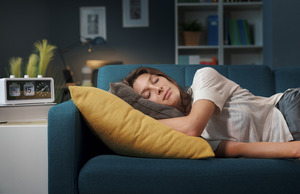
Sleep apnea is a disorder that causes your breathing to repeatedly stop and restart while you’re asleep. This can often leave you feeling excessively tired during your waking hours. You might think that taking a quick nap could help, but sadly, this isn’t really an effective solution; in fact, it may even add to your sleep problems. Below is a closer look at why sleep apnea and napping don’t mix.
Why Shouldn’t You Nap When You Have Sleep Apnea?
On the surface, it may seem like napping can help you catch up on the sleep that you might have missed out on due to sleep disordered breathing. However, sleep loss is a cumulative issue; if you fail to get enough sleep on a nightly basis, napping simply won’t be enough to make up for the resulting sleep debt. Many people with sleep apnea find that they don’t actually feel better upon waking up from a nap.
On top of that, daytime naps can interfere with your body’s sleep schedule. This can make it harder for you to fall and stay asleep at night. If you’re already struggling with sleep apnea, then the last thing you need is additional obstacles to a good night’s rest.
What Should You Do When You Have Sleep Apnea?
Obviously, if you have been diagnosed with sleep apnea, your top priority should be to have it properly treated. In many cases, your dentist can address your sleep-disordered breathing with a customized oral appliance. Wearing such an appliance at night will help you maintain a clear airway and reduce your risk of breathing interruptions.
On top of that, there are some simple steps you can take at home that can make it easier to get a better night’s rest. For example:
- You can change your sleeping position. Sleeping on your back can exacerbate sleep apnea symptoms, so try training yourself to sleep on your side instead.
- You can lose weight. Obesity is one of the most well-known risk factors for sleep apnea. As such, losing weight can often go a long way toward improving your symptoms.
- You can maintain good sleep habits. This can include going to bed at the same time every night and staying away from electronic screens in the hours before falling asleep.
In short, napping may not be the best idea when you have sleep apnea, but there are plenty of other steps you can take to address the disorder and enjoy more restful nights again.
About the Author
Dr. Ray Voller has more than 40 years of dental experience. He has earned Fellowship and Mastership Awards from the Academy of General Dentistry, and he has completed all seven levels of continuing education from the Pankey Institute. At Voller Dentistry in Kittanning, he can provide customized oral appliances as a solution for sleep apnea. If you’re in need of sleep apnea treatment, you can schedule an appointment with Dr. Voller by visiting his website or calling (724) 543-4948.
